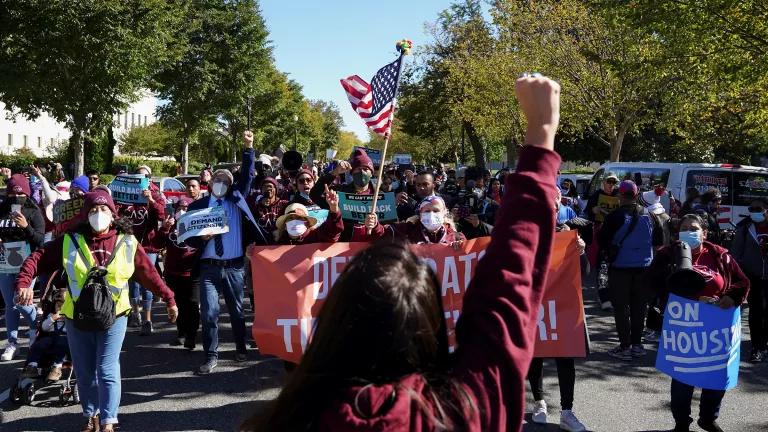Climate & Public Health Agenda for Colorado in 2022
While the beginning of 2022 may feel less certain than we’d all hoped, we’re looking forward to fighting for environmental progress in the State Capitol and beyond.

2022 is here and Colorado legislators have kicked off the new legislative session! Last year, our advocacy and partnerships helped usher in meaningful advancements in 2021, and we are excited to continue the momentum this year. While the beginning of 2022 may feel less certain than we’d all hoped, we’re looking forward to fighting for environmental progress in the State Capitol and beyond.
The devastating Marshall and Middle Fork fires in Louisville in late December once again underscored the urgent need for action. Some of our staff were personally impacted by the fires, and we remain committed to rapidly reducing emissions, ensuring community resiliency, and building back better—and greener.
Here are our top priorities in Colorado for 2022:
Ensuring a rapid and just transition to clean energy
We know that the best and most cost-effective way to meet Colorado’s climate goals is through rapid decarbonization of electricity, which means shifting from polluting fossil fuels to clean renewable energy. This year, we have several opportunities to accelerate the transition.
In particular, the state Public Utilities Commission (PUC) is reviewing plans from two large utilities, Xcel and Tri-State, on how they will provide energy to Colorado. These plans are critical in determining how quickly we’ll stop burning coal, how we’ll accelerate energy efficiency and renewable energy, and how we’ll ensure a just transition for coal workers and communities.
We support the recently filed Tri-State settlement in Phase 1 of the case. The agreement ensures the Commission will have a strong footing to evaluate accelerating coal retirement and increased clean energy in Phase 2 and makes groundbreaking progress on increased energy efficiency investments for Tri-State’s Colorado customers.
On the other hand, the Commission must reject the Xcel proposed settlement that would delay a transition away from coal at the state’s largest coal plant, and single-largest source of pollution, until 2035. Fortunately, requiring Xcel to stop burning coal in this decade would save customers hundreds of millions of dollars, as well as help fund community transition in Pueblo and other communities where coal plants are closing.
Expanding access to multimodal and electric transportation
Transportation is the largest source of greenhouse gas emissions and a leading cause of air pollution in Colorado. Expanding low-carbon travel options and electrifying vehicles is essential to cleaning up our air and fighting climate change.
This year, we’ll be supporting efforts in the legislature to expand funding for clean transportation. This includes supporting public transportation to encourage more transit ridership, funding to electrify school buses to reduce children’s exposure to dangerous emissions, and incentives for employees to commute more sustainably.
Furthermore, there will be an opportunity with a bill this session to incentivize smart land use that makes it easier for people to walk, bike, or take transit where they need to go while expanding energy efficient affordable housing—a win-win that tackles the climate and housing crises on multiple fronts. We’ll also be watching to make sure all of Colorado’s large transportation projects help increase multimodal options and reduce emissions instead of expanding or building more roads that will encourage more vehicle travel.
On the electric vehicles side, we’ll work this spring and summer to speed up the transition to zero-emission trucks and slash diesel pollution, which will help reduce greenhouse gas emissions and improve air quality in some of our neighborhoods most burdened by pollution. Finally, later this fall, we're expecting California, followed by many other states, to adopt strong emission standards that will result in all new passenger vehicles being zero-emitting and pollution-free by 2035. We'll be encouraging Colorado to join together with states to follow suit.
Advancing healthy, efficient buildings and homes
Another important bill we’re watching this session would ensure that all municipalities in the state update their building codes to require efficient, healthy buildings that are ready for the future. The bill would apply only to new buildings and set a minimum level of energy efficiency and require wiring to reduce the cost of installing electric vehicle charging, high-efficiency electric appliances, and rooftop solar, all while allowing local governments enough time to make the necessary changes without disrupting their housing markets.
We will also be working on the implementation of the landmark clean buildings laws that we helped enact last year. Effective programs that prioritize disproportionately impacted communities and make it easier and cheaper for all Coloradans to access the healthiest, most climate-friendly appliances are essential to meeting our emissions reduction goals. We will also intervene at the Public Utilities Commission to ensure that new rules for clean heat plans result in real emission reductions at the lowest cost for consumers and that gas utilities are set up to plan for the systems and workforces they will need in a climate-friendly 2050.
Protecting children from lead exposure at school
Along with advocating to reduce building emissions, we are also focused on protecting children from outdated mechanical systems in buildings, such as lead pipes and old plumbing fixtures. We are working alongside labor and environmental justice partners to pass a bill to install water filters in schools and childcare centers. Installing filters in schools and childcare centers ensures children are drinking water that is free of lead and other contaminants, such as PFAS. Thanks to Congress and the Biden administration, states have access to federal funds to cover the cost of installing these filters. So, Colorado lawmakers can ensure kids are drinking lead-free water at virtually no cost to the schools or the state.
Improving air quality
After many years of dangerous air quality, we are happy to see Governor Polis advocating for much-needed air quality improvement funding in his budget proposal. However, there is much more work to be done to reduce emissions in the industrial, energy, and transportations sectors. In addition to the bills and initiatives mentioned above that would help address air quality, another piece of legislation would improve air pollution permitting and monitoring. We’ll be following this effort, among others, and working to ensure it is as effective as possible to protect our health and environment.
Wildfires, ozone days, and ongoing drought provide increased urgency to reduce emissions. At the same time, the promise of a better future—with local economies fueled by clean, renewable energy, communities connected by expanded mobility options, and buildings that are healthy and efficient—inspires us to push for change in 2022. Stay tuned this year for ways you can help support this vision for Colorado.





